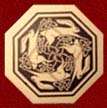Albino c
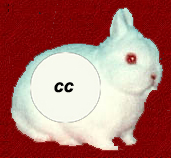
The lowest rung on the
c-series ladder of dominance is occupied by the albino c allele. Whenever a
Netherland Dwarf, regardless of which other colour genes it posesses in the a-,
b- or d- series, inherits two recessive albino cc alleles - all colour
development is entirely restricted. Not
only does every fur shaft on the rabbit's body lack pigment of either black or
yellow, but the irises of the eyes are also
uncoloured.
The iris only appears coloured from the pinkish cast of the underlying
blood vessels. Thus, the albino is
our Red-Eyed White variety. Sometimes
it can come as a surprise when a Red-Eyed White offspring they producedfrom
coloured parents. But
it is
simple to explain this when we give
an example of breeding an albino
rabbit
from coloured parents.
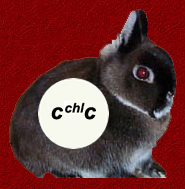 X
X
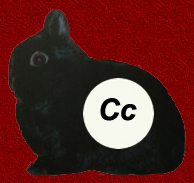
Sire
(Marten Sable) Dam (black)

offspring (red-eyed white)
Genetically, Red-Eyed Whites may be agouti-patterned,
tan-patterned or self-patterned depending upon their genetic inheritance from the
pattern
setting a-series. They may
be either basic black or basic brown from the b-series.
They may have inherited the genotype to be either dilute blue or dilute
lilac from the d-series. But
regardless of what genotype the Red-Eyed White has inherited, its phenotype is
invariable Red-Eyed White due to the effect the pair of albino cc alleles have
in restricting any colour from appearing. It
is only when we breed the homozygous albino cc Red-Eyed White to a coloured
Dwarf, that we see evidence (by the virtue of the colours of the offspring
produced) of which other colour genes the REW is carrying.
 X
X 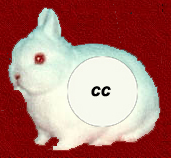
Sire (red-eyed white) Dam (red-eyed white)

offspring (red-eyed white)
As
you can see from the above illustration, the REW parents can
only transmit one or other of their
two albino c alleles to any offspring they produce, for they have no other
c-allele to transmit. Any Dwarf
inheriting a pair of albino cc gene alleles will experience a total restriction of colour
pigment.
The white rabbit
is not a blank, colour-wise,
contributing nothing towards its offpring's colour.
Try thinking of it, instead, as a camouflaged
rabbit. If a white
sheet is
covering an armchairs and then ask you to tell me what colour the chair
is - you must either say 'white' or refuse to guess because you cannot see the
chair beneath. So it is with Red-Eyed Whites and Blue-Eyed Whites. They
may really be Agouti,
Siamese
Sable or any
of the other colours underneath that white coat.
There is no way of telling
which colour genes they are carrying by merely observing them.
Consequently, we must test-breed them and observe the colours of their
offspring to discover this information. The
colour genes which are responsible for restricting all colour development from
occurring in the Red-Eyed White and Blue-Eyed White may be any of the three
colour patterns. However, since we
classify the Netherland Dwarf varieties by phenotype (by what we see) instead of
by genotype (which we cannot always see), the whites are quite sensibly assigned
to the Self Group.
Full
Colour C
back to colour distribution in the fur shaft
extension of colour in the fur shaft
